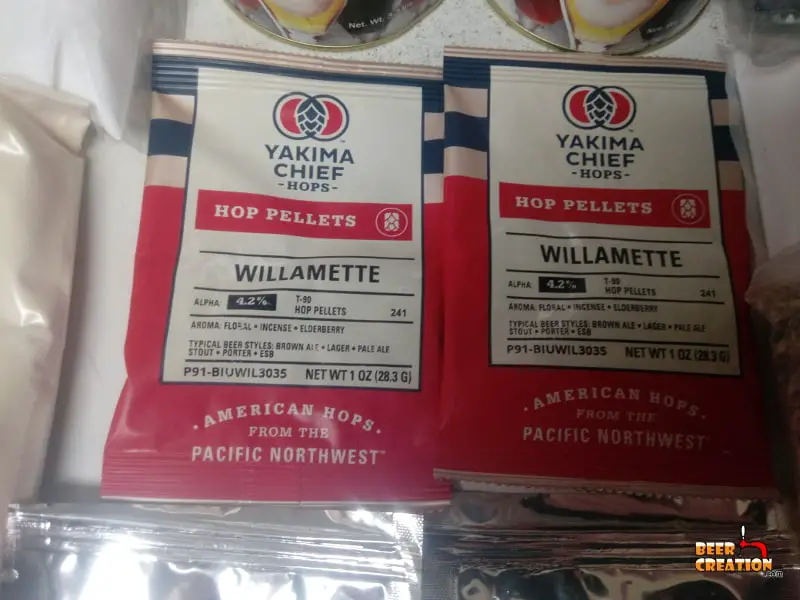If you asked me to choose one beer style to drink for the rest of my life, it’d be hard but I think IPAs would be high up on the list.
As a new brewer, I attempted an IPA on my second batch and of course came across this ‘new’ technique of dry hopping. This brought up many questions, especially whether or not adding hops to my fermented beer was safe.
Drying hopping uses whole or pellet hops. Hops themselves are excellent at combating bacteria in beer & therefore don’t require any sanitizing from the homebrewer. However, despite their qualities, hops can transport bacteria into fermented beer from other brewing equipment during dry hopping.
Now, this seems a little bit confusing, hops won’t contaminate your beer due to their chemical makeup, but they can contaminate your beer in some cases.
If you aren’t 100% clear why and what you need to do to avoid beer spoilage, then please read on as I’ve gone into great detail to explain everything as clearly as possible.
Will dry-hopping introduce bacteria into your beer?

Yes, it’s more than likely that if you put hops into your fermenter they will bring along some little friends with them to the party. However, this isn’t as worrying as you may think, mainly because of where that ‘party’ is being thrown and down to the hops themselves.
Fermented beer isn’t an easy place for most strains of bacteria to grow in, although it is entirely possible. The combination of the dominance of the yeast during fermentation and the alcohol content post-fermentation, not to mention lack of nutrients for bacteria, makes it a hostile place.
On top of all this, hops has some very interesting qualities of its own which have really helped out brewers for centuries in reducing beer spoilage. (shop for your hops online at homebrewing.org).
Are hops anti-bacterial?
Hops have many wonderful qualities from being a mild sedative to helping us brewers flavor our beer, but do they have magical anti-bacterial powers too?
In layman’s terms, because those are the only terms I really understand, hops secrete an acid called iso-alpha-acids which affects Gram-positive bacteria, especially lactic acid bacteria which can lead to beer spoilage.
The Iso-alpha-acid literally ‘attack’ the membrane of bacteria cells and make it impossible for them to take in nutrients, which there will be little of in beer anyway.
This property of hops basically kills off bacteria because it affects things like the ph gradient and makes it impossible for such bacteria to multiply, which is great for our beer.
If you want some more in-depth reading, you can check out this study here.
Whole hops or hops pellets?
In terms of which form of hops is better for dry hopping, this is really a question that every brewer will answer differently.
Whole hops (whole leaf, leaf hops or raw hops) may have a larger surface area when it comes to brewing, but are less stable than pellets and perhaps even a little less potent.
Pellets are also less susceptible to oxidation, take up less space in the fermenter but much harder to remove than whole hops.
However, both forms of hops can be used for dry hopping, with or without a bag. You can easily siphon your beer from below floating whole hops and from above pellets that settle into the bottom of the fermenter.
In terms of our question, bacteria, whole hops do contain more bacteria according to one particular study, but as we have read this isn’t necessarily a problem.
New to homebrewing? Please feel free to read my ultimate guide to brewing beer at home and where to start.
Should you sanitize the hops bag?
As I mentioned before, you can dry hop with loose whole or pellet hops, but some brewers prefer to dry hop using a bag.
If you want to use a bag, which can make it easier to remove the hops later, then you should definitely sanitize that bag.
The easiest way is simply to boil the bag, and anything you use to weigh it down or tie it off, in water. The high temperatures should be enough to kill off most unwanted bacteria.
In this case, it’s certainly a case of “it’s better to be safe than sober”.
What else should you sanitize?
It’s a good idea to clean and sanitize anything which will come into contact with your hops before you introduce it into your fermenter.
This includes:
- worktops and other surfaces
- scissors/ knife
- measuring cups
- outside of the fermenter
- and of course, the hop bag if you use one.
If you have some no-rinse sanitizer, such as Star San (see the incredible deals you can get on Amazon these days) in a spray bottle, you can do this really easily as an extra precaution.
The issue here is that although the hops themselves have these amazing antibacterial properties, all the other equipment you use doesn’t. It could be very easy to unwittingly introduce a large enough colony of bacteria to spoil your beer.
Can you use Star San on hops?
If you have diluted the Star San properly (0.4 oz/6 ml per gallon), then the Star San is safe to consume. However, if you want to do this to actually sanitize the hops, I personally haven’t heard of any evidence to suggest that you need to do this.
Small amounts of Star San in your beer won’t affect the aromas or ph levels much, but it just seems like an unnecessary step when hops are already good at combating bacteria and if they have been stored properly.
I also wouldn’t recommend trying to sanitize hops with any other sanitizing solution or even with hot water. It’s not something you need to worry about as well as you have sanitized any other equipment you use during dry hopping.
Can freezing hops kill off micro-organisms?
The simple answer to this question is that freezing your hops will do nothing more than give you cold hops. As the hops are already dried, there won’t be any creation of ice crystals in them, which do actually kill off bacteria.
This being said, micro-organisms such as bacteria and even yeast are pretty good at surviving the extreme cold. Also, freezing doesn’t sanitize anything, as soon as it reaches the ambient temperature any bacteria which existed before freezing will be reanimated.
So, don’t rely on freezing as a form of sanitizing hops or anything else.
Does beer kill off bacteria?
As we are talking about dry hopping, I’m going to concentrate on the fermented stage of beer rather than the brewing or fermentation phases. With this being said, there aren’t many things that have evolved to survive in fermented beer.
So, yes beer will ‘kill off’ bacteria, or at least make for a very hostile environment which will slow or stop their growth. So your finished beer may actually contain a lot of bacteria, but not in high enough quantities to affect its taste or aroma.
Just out of interest, let’s talk about types of bacteria that can grow in beer and could potentially be introduced through dry hopping.
Gram-positive bacteria
We’ve already mentioned this Lactic Acid Bacteria (LAB) which is found in many plants, including barley and malts as well as on us, the brewer. Basically, this is a bacteria that WILL make it into your brewery and likely into your beer.
Luckily, it’s denatured during the boiling phase of brewing and if reintroduced during dry-hopping, the hops themselves help combat its growth.
However, there are some forms of this micro-organism that can lead to spoilage because they have evolved a higher hops tolerance. Below is a list:
- Pediococcus damnosus
- Pediococcus inopinatus
- Pediococcus dextrinicus
- Pediococcus pentosaceous
- Pediococcus parvulus
- Pediococcus claussenii
- Lactobacillus brevis
- Lactobacillus casei
- Lactobacillus paracasei
- Lactobacillus plantarum
- Lactobacillus buchneri
- Lactobacillus curvatus
- Lactobacillus coryneformis
- Lactobacillus parabuchneri
- Lactobacillus delbrueckii
- Lactobacillus fermentum
- Lactobacillus fructivorans
- Lactobacillus paucivorans
- Lactobacillus paracollinoides
- Lactobacillus amylolyticus
- Lactobacillus lindneri
- Lactobacillus paraplantarum
- Lactobacillus brevisimilis
- Lactobacillus malefermentans
When allowed to multiply, these strains of bacteria will spoil the beer through acidification and may cause a haze or produce diacetyl.
Gram-negative bacteria
This type of bacteria is less of a problem in modern brewing but will affect you if your fermenter isn’t airtight. Also, if you are in the minority of brewers who barrel-aged beer, then you could still suffer from this type of bacterial infection.
However, for most homebrewers who are dry hopping, it’s not going to be a huge issue. This being said, a modern strain of Gram-negative bacteria could be introduced at the moment of pitching yeast, so taking sanitary precautions is wise.
Wild yeast
Another form of bacteria, often unwanted, which can survive in beer is known as wild yeast or by its scientific name Saccharomyces cerevisiae.
If present in your beer it can lead to increased ester or phenolic off-flavoring which most beer varieties won’t benefit from. However, if you really get into your Belgian ale recipes, you may find yourself introducing wild yeast intentionally for the flavors it gives off.
If you don’t have a lot of experience with Belgian ales, I can really recommend a visit or at least a night tasting them. As someone who lived in the country for 3 years, I have a lot to say about the place in my article here.





